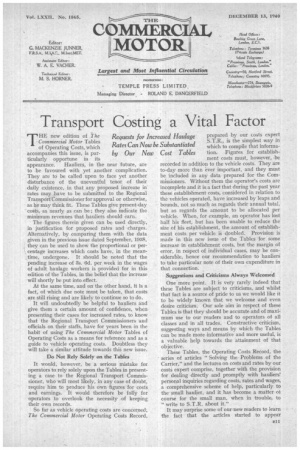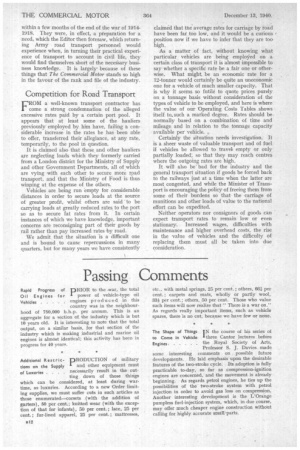Transport Costing . a Vital Factor T HE new edition of The
Page 17

Page 18

If you've noticed an error in this article please click here to report it so we can fix it.
Requests for Increased Haulage Commercial Motor Tables of Operating Costs, which Rates Can Now be Substantiated accompanies this issue, is parby Our New Cost Tables ticularly opportune in its .
appearance. Hauliers, in the near future, are to be favoured with yet another complication. They are to be called upon to face yet another disturbance of the uneventful tenor of their daily existence, in that any proposed increase in rates may have to be submitted to the Regional Transport Commissioner for approval or otherwise, as he may think fit. These Tables give present-day costs, as nearly as can be ; they also indicate the minimum revenues that hauliers should earn.
The figures therein given can be used directly, in justification for proposed rates and charges. Alternatively, by comparing them with the data given in the pre.vious issue dated September, 1938, , they can be used to show the proportional or per-, centage increases which costs have, in the mean.time, undergone. It should be noted that the pending increase of 3s. Gd. per week in the wages of adult haulage workers is provided for in this edition of the Tables, in the belief that the increase will shortly be put into effect.
At the same time, and on the other hand, It is a fact, of which due note must be taken, that costs are still rising and are likely to continue so to do.
It will undoubtedly be helpful to hauliers and give them a certain amount of confidence, when presenting their cases for increased rates, to know that the Regional Transport Commissioners and officials on their staffs, have for years been in the habit of using The Commercial Motor Tables of Operating Costs as a means for reference and as a guide to vehicle operating costs. Doubtless they will take a similar attitude towards this new issue.
Do Not Rely Solely on the Tables It would, however, be a serious mistake for operators to rely solely upon the Tables in presenting a case to the Regional Transport Commissioner, who will most likely, in any case of doubt, require him to produce his own figures for costs and earnings. It would therefore be folly for operators to overlook the necessity of keeping their own records.
So far as vehicle operating costs are concerned, The Commercial Motor Operating Costs Record, prepared by our costs expert S.T.R., is the simplest way in which to compile that information. Figures for establishment costs must, however, .be recorded in addition to the vehicle costs. They are to-day more than ever important, and they must be included in any data prepared for the Commissioners. Without them the operator's costs are incomplete and it is a fact that during the past year these establishment costs, considered in relation to the vehicles operated, have increased by 'leaps and bounds, not so much as regards their annual total, but as regards the amount to be allocated per vehicle. When, for example, an operator has lost half his fleet, but has been unable to reduce the size of his establishment, the .amount of establishment costs per vehicle is doubled. Provision is made in this new issue of the Tables for some increase in establishment costs, but the margin of error, in respect of individual cases, may be considerable, hence our recommendation to haulierS. to take particular note of their own expenditure in that connection. , Suggestions and Criticisms Always Welcomed One more point. It is very rarely indeed that these Tables are subject to criticisms, and whilst that fact is a source of pride to us we would like it to be widely known that we welcome and even desire criticism. Our sole aim in respect of these Tables is that they should be accurate and of maximum use to our readers and to Operators of all classes and in all trades. Constructive criticism, suggesting ways and means by which the Tables can be made more informative and more useful, is a valuable help towards the attainment of that objective.
These Tables, the Operating Costs Record, the series of articles " Solving the Problems of the Carrier," and the lectures on costs and rates by our costs expert comprise, together with the provision for dealing directly and promptly with hauliers' personal inquiries regarding costs, rates and wages, a comprehensive scheme of help, particularly to the small haulier, and it has become a matter oi course for the small man, when in trouble, to "write to S.T.R. about it."
It may surprise some of our new readers to learn the fact that the articles started to appear Bit within a few months of the end of the war of 19141018. They were, in effect, a preparatiOn for a need, which the Editor then foresaw, which returning Army road transport personnel would experience when, in turning their practical experience of transport to account in civil life, they would find themselves short of the necelsary business knowledge. It is largelybecause of these things that The Commercial Motor stands so high in the favour of the rank and file of the industry.
Competition for Road Transport FROM a well-known transport contractor has come a strong condemnation of the alleged excessive rates paid by a certain port pool. It appears that at least some of the hauliers previously employed by him have, failing a considerable increase in the rates he has been able to offer, transferred their allegiance, at any rate, temporarily, to the pool in question. It is claimed also that these and other hauliers are neglecting loads which they formerly carried from a London district for the Ministry of Supply and other Government Depat hnents, all of .which are vying with each other to secure more rpad transport, and that the Ministry of Food is thus winning at the expense of the others. Vehicles are being run 'empty for considerable distances in order to secure loads at the source of greater profit, whilst. others are said• to be carrying loads at greatly reduced rates to the port so as to secure fat rates from it. In certain instances of which we have knowledge, important concerns are reconsigning part of their goods by rail rather than pay increased rates by road. We admit that the situation is a difficult one and is bound to cause repercussions in many quarters, but for many years we have consistently c1aim6d that the average rates for carriage by road have been far too low, and it would be a curious • position now if we have to infer that they are too high. As a matter of fact, without knowing what particular, vehicles are being employed on a certain class of transport it is almost impossible to say whether a specific rate be a fair one or otherwise. What might be an economic rate for a 12-tonner would certainly be quite an uneconomic one for a vehicle of much smaller capacity. That is why it seems so futile to quote prices purely on a tonnage basis without consideration of the types of vehicle to be employed, and here is where the value of our Operating Costs Tables shows itself to. such a marked degree. Rates should be normally based on a combination of time and mileage and in relation to the tonnage capacity available per vehicle. . Certainly the situation needs investigation. It is a sheer waste of valuable transport and of fuel if vehicles be allowed to travel empty or only partially loaded; so that they may reach centres where the outgoing rates are high. It will also be' bad for the industry and the general transport situation if goods be forced back to the railways just at a time when the latter are most congested, and while the Minister of Transport is encouraging the policy of freeing them from some of their burdens so that the carriage of munitions and other loads of value to the national effort can be expedited. Neither operators nor consignors of goods can expect transport rates to remain low or even stationary. Increased wages, difficulties with maintenance and higher overhead costs, the rise in the value of vehicles and the difficulty of replacing them must all be taken into due consideration.




























































